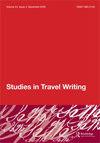A short history of humour in travel writing
Q2 Arts and Humanities
引用次数: 1
Abstract
ABSTRACT Until comparatively recent times, travel writing has not been a genre renowned for its humorous qualities. Yet nothing demonstrates the cultural and historical relativity of humour as clearly as the evolution of travel writing from the early nineteenth century onwards. With a focus on three narratives of failed quests, this essay traces the broad developmental arc of humour in travel writing over two hundred years. The narrative of John Ross’s Arctic expedition exemplifies the way in which colonial-era writing invites readers to share a comic superiority over simple-minded indigenes. From the mid-twentieth century, Eric Newby’s work illustrates a trend towards self-irony and self-mockery whereby humour becomes a versatile expression of the rhetoric of anti-conquest. Finally, Bill Bryson’s books typify the increasing reliance in contemporary writing on incongruities of form and content and other strategies consistent with the development of a post-touristic travel stance.旅游写作幽默简史
摘要直到最近,旅行写作还不是一种以幽默著称的文体。然而,没有什么能像19世纪初以来旅行写作的演变那样清楚地表明幽默的文化和历史相关性。本文通过对三个失败任务的叙述,追溯了两百年来幽默在旅行写作中的广泛发展轨迹。约翰·罗斯(John Ross)的北极探险故事体现了殖民时代的写作邀请读者分享比头脑简单的穷人更具喜剧优势的方式。从二十世纪中期开始,埃里克·纽比的作品展示了一种自我讽刺和自嘲的趋势,幽默成为反征服修辞的通用表达方式。最后,比尔·布莱森的书代表了当代写作越来越依赖形式和内容的不协调,以及与后旅游主义旅行立场的发展相一致的其他策略。
本文章由计算机程序翻译,如有差异,请以英文原文为准。
求助全文
约1分钟内获得全文
求助全文
来源期刊

Studies in Travel Writing
Arts and Humanities-Literature and Literary Theory
CiteScore
0.40
自引率
0.00%
发文量
13
期刊介绍:
Founded in 1997 by Tim Youngs, Studies in Travel Writing is an international, refereed journal dedicated to research on travel texts and to scholarly approaches to them. Unrestricted by period or region of study, the journal allows for specific contexts of travel writing to be established and for the application of a range of scholarly and critical approaches. It welcomes contributions from within, between or across academic disciplines; from senior scholars and from those at the start of their careers. It also publishes original interviews with travel writers, special themed issues, and book reviews.
 求助内容:
求助内容: 应助结果提醒方式:
应助结果提醒方式:


